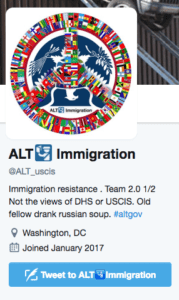The Corporate Accountability News Roundup is a new series by Ranking Digital Rights that highlights key news related to tech companies, freedom of expression, and privacy issues around the world.
Twitter takes on Trump
 According to Twitter, the Trump administration last week withdrew its attempt to force the company to reveal the identity of one its users. The account, @ALT_USCIS, is one of several “alt agency” accounts created after President Donald Trump took office, and which tweets criticisms of the administration. In response, Twitter announced it was suing the US government on grounds the demand was “unlawful and unenforceable because it violates the First Amendment rights of both Twitter and its users by seeking to unmask the identity of one or more anonymous Twitter users voicing criticism of the government on matters of public concern.” Twitter dropped its lawsuit after the government withdrew the summons.
According to Twitter, the Trump administration last week withdrew its attempt to force the company to reveal the identity of one its users. The account, @ALT_USCIS, is one of several “alt agency” accounts created after President Donald Trump took office, and which tweets criticisms of the administration. In response, Twitter announced it was suing the US government on grounds the demand was “unlawful and unenforceable because it violates the First Amendment rights of both Twitter and its users by seeking to unmask the identity of one or more anonymous Twitter users voicing criticism of the government on matters of public concern.” Twitter dropped its lawsuit after the government withdrew the summons.
The Ranking Digital Rights 2017 Corporate Accountability Index looks for companies to disclose their processes for responding to government requests for user information, including if the company carries out due diligence on government requests before deciding how to respond, and commits to push back on inappropriate or overbroad government requests. This recent case is an example of Twitter implementing these commitments. Our research showed that Twitter clearly disclosed its processes for responding to government requests for user information (P10) and also topped all internet and mobile companies evaluated for its transparency reporting on the government and private requests it receives to hand over user information (P11).
In Europe: bans on encryption, hate speech
The EU Justice Commissioner Věra Jourová has indicated the European Commission will propose new rules this June allowing law enforcement to access information from encrypted apps. This follows pressure from the governments of France, Germany, and the UK–including the recent call from UK Home Secretary Amber Rudd’s for police to be able to access encrypted chats from WhatsApp and similar services. However, as technical experts have continued to caution, allowing such access would prevent companies from being able to deploy secure end-to-end encryption and would put user privacy at risk. In our recommendations for companies, we note that except where permitted by law, companies should publicly commit to implement the highest encryption standards available, including end-to-end encryption. The EU’s proposed rules could prevent companies from being able to do so.
Germany’s cabinet has approved a plan that would fine social media networks for not removing hate speech content quickly enough. This plan raises numerous freedom of expression concerns, and puts companies, rather than courts, in the position of determining what speech is legally permissible. As noted in our recommendations for governments, authorities should limit legal liability imposed on companies for their users’ speech and other activities, in consistency with the Manila Principles on Intermediary Liability.
New rumors about Google’s return to China
The South China Morning Post reported that Google is engaged in talks with the Chinese government to potentially re-enter the Chinese market with certain services, such as Google Scholar. Google has not confirmed or commented about these discussions or whether or not it plans to re-enter China. However, the company did announce that users in China can now download the Translate app, which the Washington Post writes may be a signal that the company is slowing moving back into the Chinese market. In 2010, Google formally withdrew from China and shut down its Chinese-language search engine, citing concerns over censorship. Google’s products are currently blocked by the Chinese government’s “Great Firewall” and are not available to Chinese users without use of censorship circumvention technology.
Tech companies should conduct human rights impact assessments (HRIAs) before launching new services or entering new markets, to identify any risks to user free expression and privacy and take necessary steps to mitigate these risks. This is particularly important before launching any services in markets, such as in China, where the government has a record of human rights abuses.
As our research in the 2017 Index showed, Google expressed a commitment to carry out HRIAs, stating: “Prior to localizing in a new market, the company approach is to first examine the government’s record with respect to freedom of expression and privacy by consulting reports prepared by NGOs and analyzing the laws that are relevant for freedom of expression and privacy in that country.” Therefore, if reports that Google is considering re-entry into China are true, Google should live up to its stated commitments and be carrying out human rights impact assessments that will help it determine whether or how its presence in China may change in the future.
Our research indicates that although many aspects of Chinese companies’ poor performance in the 2017 Index can be blamed on China’s legal and regulatory environment, there are some areas in which companies still have room to improve their disclosures on certain privacy and free expression issues. For more on this, check out our analysis comparing free expression and privacy disclosures from Baidu and Tencent.




